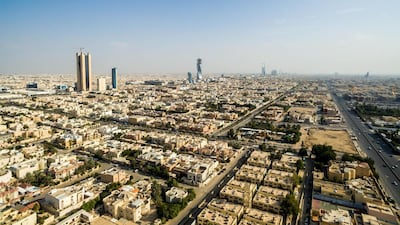Foreign direct investment into Saudi Arabia rose 22 per cent annually last year as the kingdom continues to pursue its economic transformation agenda and open up more sectors for foreign investments.
Total FDI inflows into the Arab world’s largest economy reached 122 billion Saudi riyals ($33 billion) in 2022, the kingdom’s Ministry of Investment said in a statement on Wednesday.
Saudi Arabia released the latest statistics following a change in the methodology used for the calculation of FDI inflows.
The new methodology, endorsed by the International Monetary Fund, uses an analysis of individual financial statements to produce “highly accurate” annual numbers instead of the old method of using the accumulation of flows based on estimates.
“Investors are entering the fast-growing Saudi market with confidence due to its size and strategic position, which provides an excellent platform to access growth opportunities across the Middle East and beyond,” Khalid Al Falih, Saudi Arabia’s Minister of Investment, said.
“The updated data, produced under the new methodology, along with our investor outreach programmes, will allow us to respond to and calibrate the investment environment to attract and retain even more investors.”
Saudi Arabia, Opec's largest producer, is radically transforming its economy to cut its dependence on hydrocarbon revenues to fuel its economy. Riyadh has opened up strategic sectors including tourism and manufacturing to develop a series of projects.
The kingdom has also implemented several reforms over the past few years to boost foreign investment flows into Saudi equities listed on the Tadwaul exchange, the biggest bourse in the Arab world.
Last month, Gemcorp Capital, a global asset management firm specialising in emerging markets, said it is planning to launch an inaugural investment fund for Saudi Arabia with an initial target of $1 billion. With the fund, the UK-based company aims to offer an opportunity for both global and domestic investors to invest in key projects aligned with the kingdom’s 2030 vision programme.
Saudi Arabia also granted an industrial licence to Ceer, a joint venture between the Public Investment Fund and Taiwan’s Foxconn, to start manufacturing electric vehicles in the kingdom. The country's sovereign wealth fund, the Public Investment Fund, also joined hands with South Korea’s Hyundai to jointly build a car manufacturing plant in the kingdom, with an estimated investment of more than $500 million, in a push to develop its automotive industry.

Earlier this year, it launched four special economic zones to offer companies financial and non-financial incentives and attract more investment into the country.
They are the King Abdullah Economic City SEZ, Jazan SEZ, Ras Al Khair SEZ and Cloud Computing SEZ, which is in the King Abdulaziz City for Science and Technology.
“The zones are part of efforts to strengthen our standing as an investment hub and provide businesses with a launch pad for growth to new targeted markets,” Mr Al Falih told the Saudi Special Economic Zones Investment Forum in May.
Taking into account the impact of Covid-19, the updated data shows that the trend of both the stock and inflows of FDI have “positively and steadily increased” since the launch of the Vision 2030 strategy in 2016, according to the Ministry of Investment.
Under the new methodology, the stock of FDI was calculated at 775 billion riyals in 2022, placing Saudi Arabia in 16th position among G20 economies last year. This was a downward correction from around 1 trillion riyals under the old methodology.
FDI inflows, however, have doubled from 2015, ranking the kingdom in 10th place among G20 economies last year. Under the old methodology, FDI inflows into the kingdom were estimated at about 30 billion riyals.
“Access to high-quality data is essential for tracking investment performance, which accounted for approximately 25 per cent of the kingdom's gross domestic product in 2022 and is expected to reach 30 per cent by 2030,” the ministry said.
The updated methodology will also produce more detailed information for investors to base their decisions on, with more than 20 new FDI indicators including FDI stock and inflows by economic activity, source country, ultimate destination country, and Saudi administrative region that will “help determine investment opportunities across the country’s priority non-oil sectors and attract more investors,” it said.


